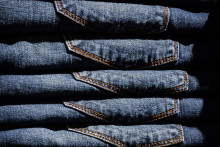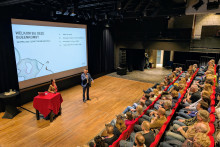The research project was carried out by Master’s students of Environmental and Energy Management program at CSTM. ‘MUD Jeans is a frontrunner in reducing environmental and societal impact. It is a very bold and interesting idea to offer a service instead of a product. It is common to lease a car or a bike, but clothes are something very personal, and so this service requires a special approach,’ explains Laura Franco Garcia, who is one of the project supervisors together with Hilde van Meerendonk-Obinna.
Avoiding pollution
Textile industry is one of the most polluting industries in the world, which is why many companies are starting to adopt sustainable ways of producing fashion items. ‘MUD Jeans leases clothing to consumers for one year for a monthly payment, which includes a free repair service. This way the company keeps the ownership of the jeans and avoids post-consumption pollution. Once they recover the jeans, they decide whether the jeans should be recycled or reused,’ clarifies Franco Garcia.
Why would customers lease jeans?
The main objective of the UT research was to increase sales of the company – in better words, to increase the number of their lease contracts. The project was in the hands of five international students: Carol Mungo, Ellison Sichiweza, Fizul Surya Pribadi, James Kariuki and Yuexin Zhang.
‘Our task was to answer how consumers perceive this enterprise and the notion of leasing one’s jeans instead of buying them,’ says Carol Mungo. ‘We focused on three consumer values - social, emotional and functional -, trying to find out what would make consumers choose the product. Is it the cost, the company’s approach, peer’s interest?’
Sell the experience
The study found that price seems to be the main deciding factor for most customers. Consumers mainly consider if the price of leasing jeans is lower than the price of owning them. (The rent for a pair of MUD jeans is 7,50 euros per month.) Further, the research concluded that consumers look at the offered variety of jeans, the social and environmental benefits of the service, but also at opinions within their social circle.
Based on these findings, the UT students suggest that the best approach for a company focused on sustainable fashion is to create a story and make consumers a part of the story. In the students’ words, the business should therefore focus on selling the experience and not necessarily the product.







